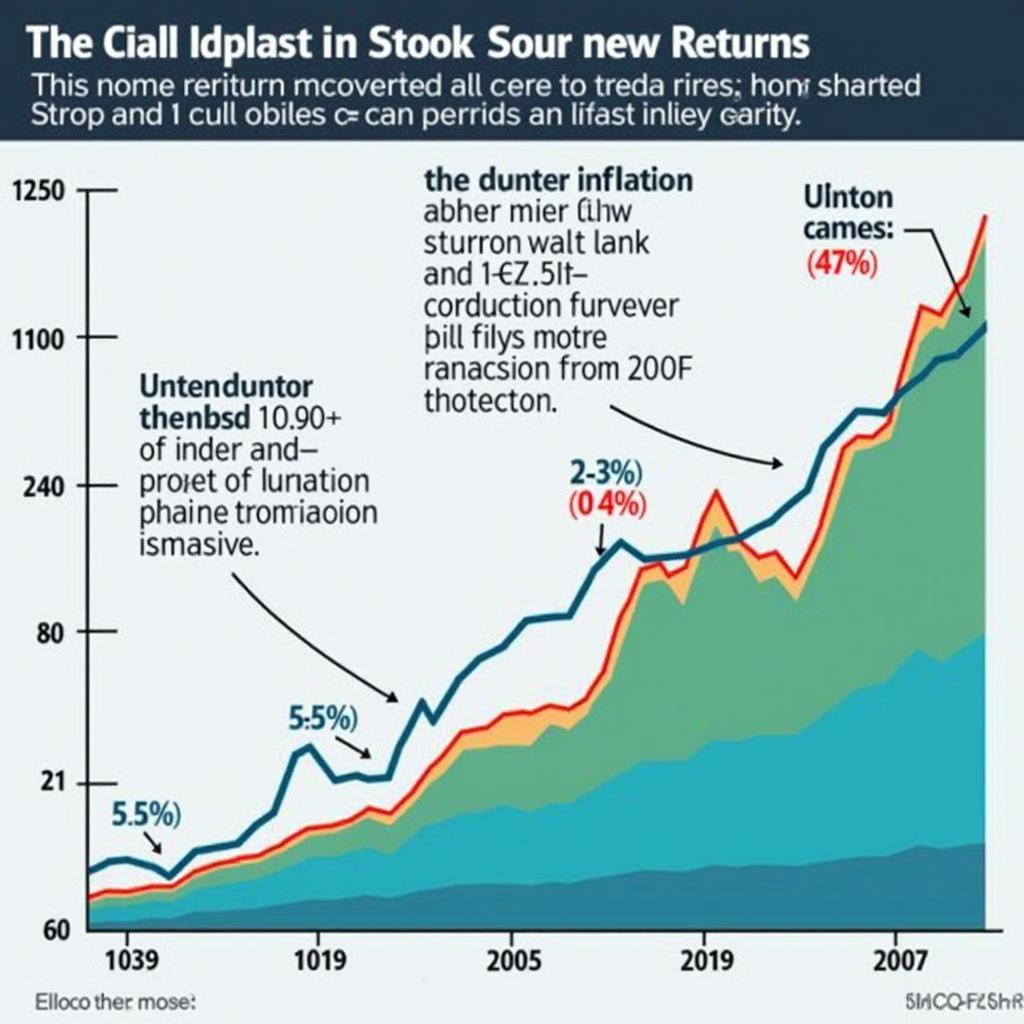Trong những năm gần đây, chủ đề về hệ thống tài chính và vai trò của các tổ chức trung gian như công ty bảo hiểm ngày càng xuất hiện nhiều hơn trong các đề thi IELTS Writing Task 2. Đây là một chủ đề thuộc nhóm Economy & Finance – một trong những chủ đề thường xuyên xuất hiện với tần suất khoảng 10-15% các đề thi thực tế hàng năm. Hiểu rõ về mối quan hệ giữa thị trường bảo hiểm và ổn định tài chính không chỉ giúp bạn viết bài tốt hơn mà còn mở rộng kiến thức về cách hoạt động của nền kinh tế hiện đại.
Bài viết này sẽ cung cấp cho bạn ba bài mẫu hoàn chỉnh ở các band điểm khác nhau (Band 5-6, Band 6.5-7, và Band 8-9), kèm theo phân tích chi tiết về điểm mạnh và điểm yếu của từng bài. Bạn sẽ học được cách triển khai ý tưởng một cách mạch lạc, sử dụng từ vựng học thuật chính xác, và áp dụng các cấu trúc ngữ pháp phức tạp để đạt điểm cao.
Các đề thi thực tế đã xuất hiện liên quan đến chủ đề này bao gồm:
- “Some people believe that financial institutions play a crucial role in maintaining economic stability. To what extent do you agree or disagree?” (thi tại British Council, tháng 9/2022)
- “Insurance companies have become increasingly important in modern economies. Discuss the advantages and disadvantages of this trend.” (thi tại IDP, tháng 3/2023)
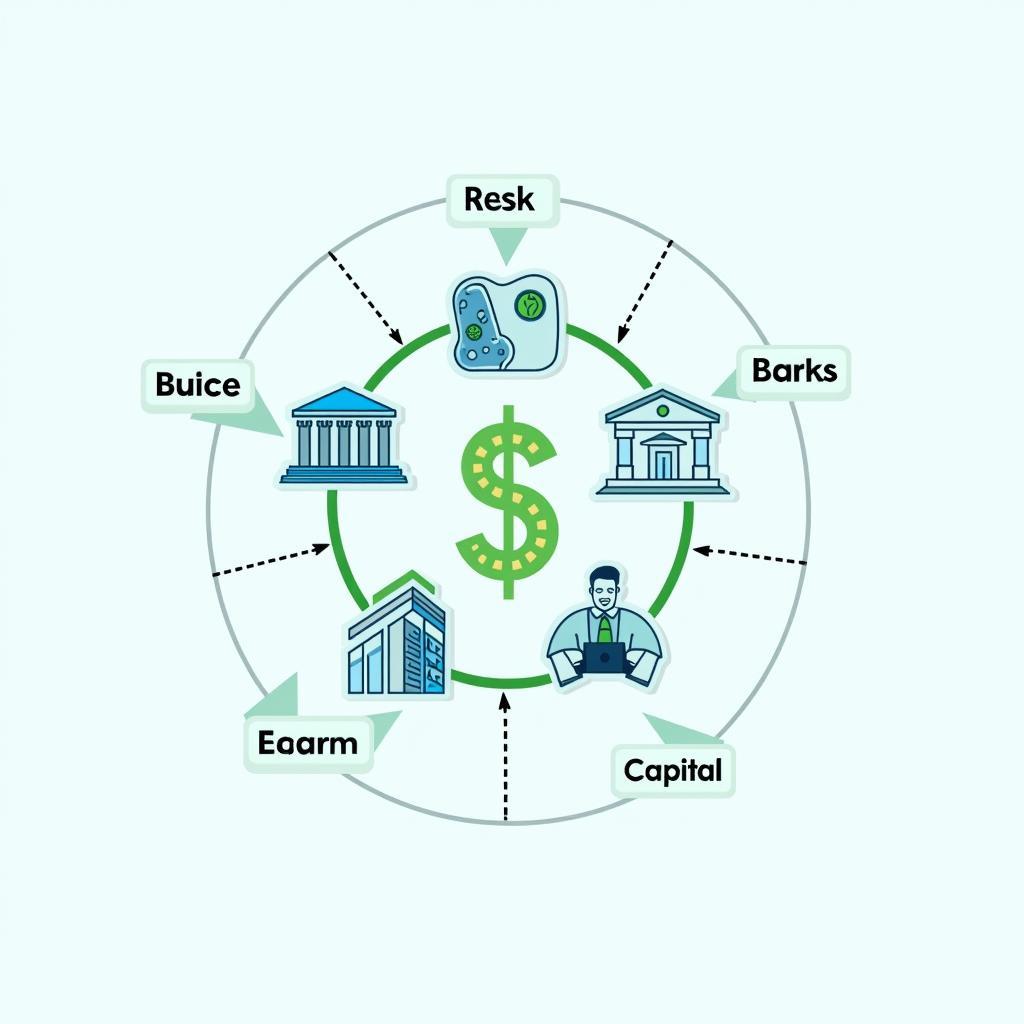 Minh họa mối quan hệ giữa thị trường bảo hiểm và ổn định tài chính trong nền kinh tế
Minh họa mối quan hệ giữa thị trường bảo hiểm và ổn định tài chính trong nền kinh tế
Đề Writing Task 2 Thực Hành
Some economists argue that the insurance market is essential for maintaining financial stability in modern economies, while others believe its impact is often overestimated. Discuss both views and give your own opinion.
Dịch đề: Một số nhà kinh tế cho rằng thị trường bảo hiểm là yếu tố thiết yếu để duy trì sự ổn định tài chính trong các nền kinh tế hiện đại, trong khi những người khác tin rằng tác động của nó thường bị đánh giá quá cao. Thảo luận cả hai quan điểm và đưa ra ý kiến của bạn.
Phân tích đề bài:
Đây là dạng câu hỏi Discussion + Opinion – một trong những dạng phổ biến nhất trong IELTS Writing Task 2. Yêu cầu của đề bài gồm ba phần chính:
- Thảo luận quan điểm thứ nhất: Thị trường bảo hiểm là thiết yếu cho ổn định tài chính
- Thảo luận quan điểm thứ hai: Tác động của thị trường bảo hiểm bị đánh giá quá cao
- Đưa ra quan điểm cá nhân của bạn
Các thuật ngữ quan trọng cần hiểu:
- Insurance market (thị trường bảo hiểm): Hệ thống các công ty và tổ chức cung cấp dịch vụ bảo hiểm
- Financial stability (ổn định tài chính): Tình trạng hệ thống tài chính hoạt động trơn tru, không có khủng hoảng
- Overestimated (đánh giá quá cao): Cho rằng vai trò hoặc tầm quan trọng lớn hơn thực tế
Những lỗi thường gặp của học viên Việt Nam:
- Chỉ tập trung vào một quan điểm và bỏ qua quan điểm còn lại
- Không đưa ra quan điểm cá nhân rõ ràng
- Viết về bảo hiểm nói chung thay vì tập trung vào mối liên hệ với ổn định tài chính
- Sử dụng từ vựng quá đơn giản hoặc không chính xác về lĩnh vực tài chính
Cách tiếp cận chiến lược:
Bạn nên tổ chức bài viết theo cấu trúc 4 đoạn:
- Mở bài: Paraphrase đề bài và nêu rõ bạn sẽ thảo luận cả hai quan điểm trước khi đưa ra ý kiến
- Thân bài 1: Giải thích tại sao thị trường bảo hiểm được coi là thiết yếu (2-3 lý do cụ thể)
- Thân bài 2: Trình bày lập luận về việc tác động bị đánh giá quá cao (2-3 lý do cụ thể)
- Kết bài: Tóm tắt và nêu rõ quan điểm cá nhân với lập luận ngắn gọn
Để đạt điểm cao, bạn cần cân bằng cả hai quan điểm và đưa ra quan điểm của mình một cách thuyết phục, có dẫn chứng cụ thể. Khi thảo luận về role of government in financial regulation, bạn có thể tăng độ sâu cho lập luận về vai trò giám sát thị trường bảo hiểm.
Bài Mẫu Band 8-9
Dưới đây là bài mẫu đạt tiêu chuẩn Band 8-9, thể hiện khả năng sử dụng ngôn ngữ tinh tế, lập luận chặt chẽ và phát triển ý tưởng toàn diện.
The insurance industry’s contribution to economic stability has become a contentious issue among financial experts. While some economists contend that insurance markets are indispensable pillars of financial security, others argue that their significance is often inflated beyond their actual impact. This essay will examine both perspectives before presenting my own viewpoint.
On one hand, proponents of the insurance sector emphasize its crucial role in risk mitigation and capital distribution. Insurance companies function as risk absorbers, transferring potential financial losses from individuals and businesses to specialized institutions with the capacity to manage such uncertainties. For instance, property insurance enables homeowners to recover from natural disasters without facing bankruptcy, thereby preventing cascading financial failures that could destabilize banking systems. Furthermore, insurance firms manage substantial investment portfolios, channeling billions of dollars into long-term infrastructure projects and government bonds, which contributes to sustained economic growth. The 2008 financial crisis demonstrated this when the near-collapse of AIG threatened to trigger a systemic meltdown, underscoring how deeply insurance companies are embedded in financial networks.
Conversely, critics maintain that the insurance market’s influence on financial stability is frequently overstated. They point out that the vast majority of economic stability stems from central banking policies and fiscal regulations rather than insurance mechanisms. During economic downturns, it is typically government intervention and monetary policy adjustments that restore confidence, not insurance payouts. Additionally, the insurance sector itself can pose systemic risks when companies engage in speculative investments or inadequate risk assessment, as evidenced by the aforementioned AIG debacle. Critics also note that in developing economies with limited insurance penetration, financial systems still maintain reasonable stability through alternative mechanisms such as community savings networks and governmental safety nets.
In my considered opinion, while the insurance market’s role should not be dismissed, it functions as a complementary rather than foundational element of financial stability. The sector undoubtedly enhances economic resilience by distributing risk efficiently, yet fundamental stability derives from robust regulatory frameworks, prudent fiscal policies, and well-capitalized banking systems. The insurance market amplifies these existing foundations but cannot substitute for them, much like how airbags improve vehicle safety without replacing the need for structural integrity and proper engineering.
In conclusion, although insurance markets contribute meaningfully to economic stability through risk management and capital allocation, their impact operates within a broader ecosystem of financial safeguards. A balanced perspective recognizes insurance as an important but not singular determinant of financial stability in contemporary economies.
(Word count: 419)
Phân Tích Band Điểm
| Tiêu chí | Band | Nhận xét |
|---|---|---|
| Task Response (Hoàn thành yêu cầu) | 9 | Bài viết thảo luận đầy đủ và cân bằng cả hai quan điểm với độ sâu ấn tượng. Quan điểm cá nhân được trình bày rõ ràng và có sức thuyết phục cao. Các ý tưởng được phát triển hoàn toàn với ví dụ cụ thể (AIG 2008) và so sánh sâu sắc. |
| Coherence & Cohesion (Mạch lạc & Liên kết) | 9 | Cấu trúc logic hoàn hảo với progression tự nhiên. Sử dụng đa dạng các từ nối tinh tế (“Conversely”, “Furthermore”, “Additionally”). Mỗi đoạn có chủ đề rõ ràng và phát triển mạch lạc. Sử dụng referencing thành thạo (the aforementioned, this, such). |
| Lexical Resource (Từ vựng) | 9 | Từ vựng học thuật phong phú và chính xác tuyệt đối: “indispensable pillars”, “cascading financial failures”, “systemic meltdown”, “embedded in financial networks”. Collocation tự nhiên và sophisticated. Không có lỗi về word choice. |
| Grammatical Range & Accuracy (Ngữ pháp) | 9 | Sử dụng đa dạng cấu trúc phức tạp một cách tự nhiên: mệnh đề quan hệ rút gọn, cụm phân từ, câu chẻ, so sánh phức tạp. Không có lỗi ngữ pháp đáng kể. Câu văn dài nhưng vẫn rõ ràng và dễ theo dõi. |
Các Yếu Tố Giúp Bài Này Được Chấm Điểm Cao
-
Thesis statement mạnh mẽ và nuanced: Thay vì đồng ý hoàn toàn với một bên, người viết đưa ra quan điểm tinh tế rằng bảo hiểm là “complementary rather than foundational element” – thể hiện tư duy phản biện cao.
-
Sử dụng ví dụ cụ thể có chứng thực: Việc đề cập đến khủng hoảng AIG năm 2008 không chỉ là ví dụ chung chung mà là case study thực tế, cho thấy hiểu biết sâu về chủ đề.
-
Topic sentences rõ ràng và có signposting: Mỗi đoạn thân bài bắt đầu bằng câu chủ đề mạch lạc (“On one hand, proponents…”, “Conversely, critics maintain…”) giúp examiner dễ dàng theo dõi.
-
Kết hợp ý tưởng trừu tượng và cụ thể: Bài viết không chỉ nói về lý thuyết mà còn giải thích cơ chế cụ thể như “transferring potential financial losses” và “channeling billions into infrastructure”.
-
Paraphrasing thành thạo: Người viết diễn đạt cùng một ý tưởng bằng nhiều cách khác nhau: “indispensable pillars”, “crucial role”, “important but not singular determinant”.
-
Sử dụng metaphor hiệu quả: So sánh bảo hiểm với túi khí ô tô trong đoạn quan điểm cá nhân là một cách giải thích trực quan và ấn tượng.
-
Kết bài không lặp lại máy móc: Thay vì chỉ tóm tắt, người viết tổng hợp lại với cách diễn đạt mới “operates within a broader ecosystem” – thể hiện khả năng ngôn ngữ linh hoạt.
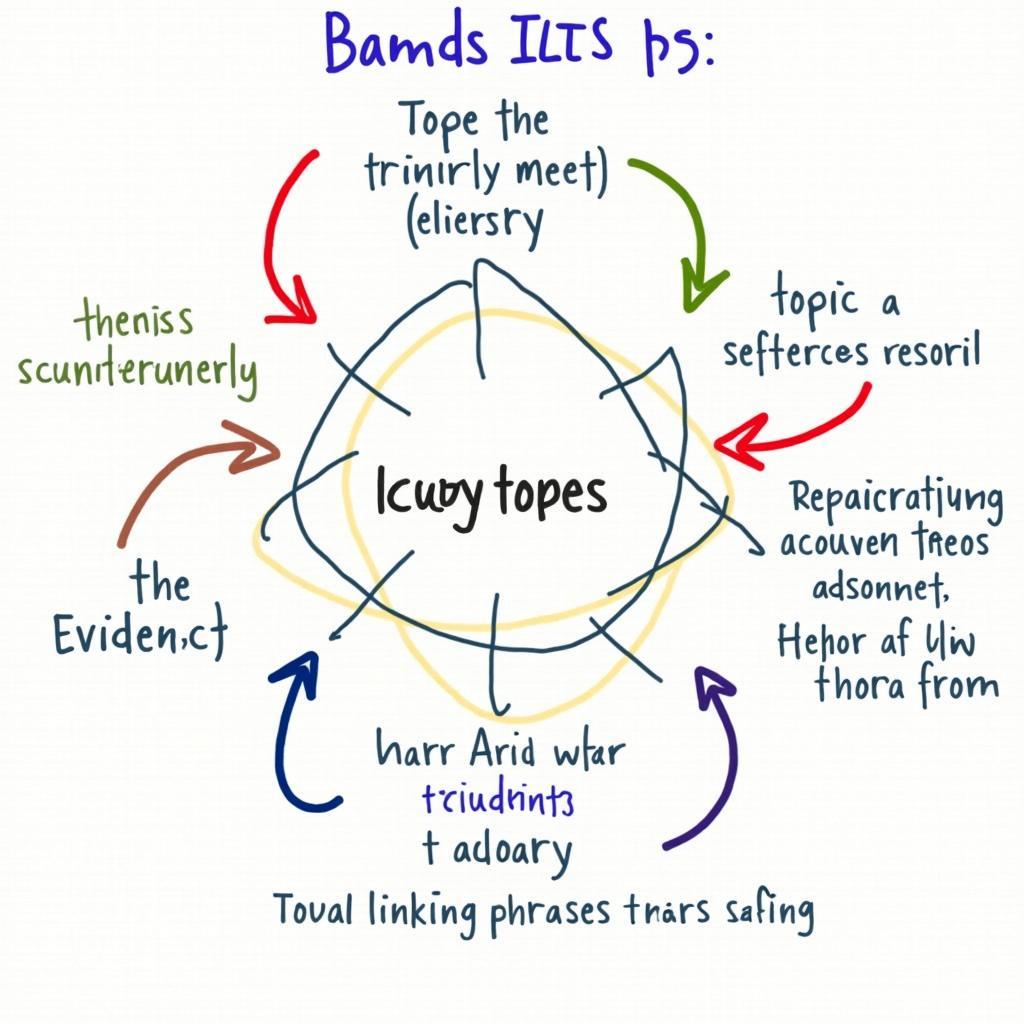 Phân tích chi tiết các yếu tố giúp bài viết IELTS đạt band điểm cao về thị trường bảo hiểm
Phân tích chi tiết các yếu tố giúp bài viết IELTS đạt band điểm cao về thị trường bảo hiểm
Bài Mẫu Band 6.5-7
Bài viết dưới đây thể hiện trình độ trung cấp khá, với khả năng trình bày ý tưởng rõ ràng nhưng chưa thực sự tinh tế về ngôn ngữ và độ sâu lập luận.
The role of insurance companies in keeping financial systems stable is a debated topic. Some people think insurance is very important for economic stability, but others believe its importance is exaggerated. In this essay, I will discuss both sides and give my opinion.
On the one hand, insurance plays an important role in protecting the economy from risks. Insurance companies help individuals and businesses by covering their losses when accidents or disasters happen. For example, if a factory burns down, the insurance company will pay for the damages, so the business owner does not lose everything. This prevents businesses from closing down suddenly, which could cause unemployment and economic problems. Moreover, insurance companies invest a lot of money in different sectors, such as real estate and government bonds. These investments help the economy grow and create jobs. Therefore, many economists believe that insurance is essential for maintaining financial stability.
On the other hand, some experts argue that the importance of insurance is often overestimated. They say that other factors, like government policies and central banks, are much more important for keeping the economy stable. For instance, during the 2008 financial crisis, it was government bailouts and changes in interest rates that saved the economy, not insurance companies. In fact, some insurance companies like AIG actually caused problems during the crisis because they made risky investments. Furthermore, in many developing countries where few people have insurance, the economy still functions reasonably well. This shows that insurance is not as essential as some people claim.
In my opinion, insurance is important but not the most important factor for financial stability. While it helps protect people and businesses from risks, the government and banking system play a bigger role in keeping the economy stable. Insurance should be seen as a supporting element rather than the main foundation of financial stability.
In conclusion, although insurance markets contribute to economic stability by managing risks and investing money, their role is less critical than other financial institutions and government policies. Both perspectives have valid points, but I believe a balanced view recognizes insurance as helpful but not essential.
(Word count: 358)
Phân Tích Band Điểm
| Tiêu chí | Band | Nhận xét |
|---|---|---|
| Task Response (Hoàn thành yêu cầu) | 6.5 | Bài viết đề cập đến cả hai quan điểm và có nêu ý kiến cá nhân. Tuy nhiên, sự phát triển ý tưởng còn đơn giản và thiếu chiều sâu. Ví dụ về nhà máy cháy là generic, không cụ thể như case study trong bài Band 8-9. |
| Coherence & Cohesion (Mạch lạc & Liên kết) | 7 | Cấu trúc rõ ràng với từ nối cơ bản được sử dụng đúng (“On the one hand”, “Moreover”, “Furthermore”). Tuy nhiên, progression giữa các ý còn mechanical và thiếu sự linh hoạt. Referencing đơn giản. |
| Lexical Resource (Từ vựng) | 6.5 | Từ vựng đủ để truyền đạt ý tưởng nhưng thiếu tính sophisticated. Có một số collocation tốt như “government bailouts”, “risky investments” nhưng còn nhiều cụm từ đơn giản như “very important”, “a lot of money”. Lặp lại từ “important” nhiều lần. |
| Grammatical Range & Accuracy (Ngữ pháp) | 7 | Sử dụng mix của câu đơn và câu phức. Có một số cấu trúc phức như mệnh đề quan hệ và câu điều kiện, nhưng chủ yếu là các pattern cơ bản. Không có lỗi ngữ pháp nghiêm trọng, nhưng thiếu variety. |
So Sánh Với Bài Band 8-9
1. Về mặt từ vựng:
Band 6.5-7: “Insurance plays an important role in protecting the economy from risks.”
Band 8-9: “Insurance companies function as risk absorbers, transferring potential financial losses from individuals and businesses to specialized institutions.”
→ Bài Band 8-9 sử dụng từ vựng chuyên ngành chính xác hơn (“risk absorbers”, “transferring financial losses”) thay vì cụm từ chung chung.
2. Về mặt phát triển ý tưởng:
Band 6.5-7: “For example, if a factory burns down, the insurance company will pay for the damages, so the business owner does not lose everything.”
Band 8-9: “For instance, property insurance enables homeowners to recover from natural disasters without facing bankruptcy, thereby preventing cascading financial failures that could destabilize banking systems.”
→ Bài Band 8-9 không dừng lại ở việc miêu tả cơ chế cơ bản mà còn giải thích tác động lan tỏa (“cascading financial failures”) – thể hiện critical thinking.
3. Về mặt câu chủ đề:
Band 6.5-7: “On the one hand, insurance plays an important role in protecting the economy from risks.”
Band 8-9: “On one hand, proponents of the insurance sector emphasize its crucial role in risk mitigation and capital distribution.”
→ Câu chủ đề Band 8-9 cụ thể hơn, đề cập đến hai chức năng chính (risk mitigation & capital distribution) thay vì nói chung chung.
4. Về mặt quan điểm cá nhân:
Band 6.5-7: “In my opinion, insurance is important but not the most important factor for financial stability.”
Band 8-9: “In my considered opinion, while the insurance market’s role should not be dismissed, it functions as a complementary rather than foundational element of financial stability.”
→ Quan điểm Band 8-9 nuanced hơn với từ “complementary rather than foundational” – thể hiện sophisticated thinking thay vì chỉ so sánh đơn giản.
5. Về mặt liên kết ý tưởng:
Band 6.5-7: Sử dụng mainly basic linking words và progression tương đối predictable.
Band 8-9: Sử dụng referencing phức tạp (“as evidenced by the aforementioned AIG debacle”, “such uncertainties”) và implicit linking thông qua logical flow.
Bài Mẫu Band 5-6
Bài viết này thể hiện khả năng cơ bản trong việc truyền đạt ý tưởng nhưng có nhiều hạn chế về ngôn ngữ và tổ chức.
Nowadays, insurance companies are very important in the economy. Some people say that insurance market is essential for financial stability. But other people think its impact is overestimated. I will discuss both view in this essay.
First, insurance is very useful for the economy. When people have insurance, they can protect their property and business. If something bad happen like accident or fire, the insurance company will pay money to them. So they will not lose all their money and can continue their life normally. This is good for the economy because it help people feel safe. Also, insurance companies have a lot of money and they invest it in many places. This create jobs and help economy growth. So insurance is important for financial stable.
However, some people disagree with this idea. They think insurance is not so important as people think. The government and banks are more important for economy stable. When there is economic crisis, the government help people and companies, not the insurance. For example, in 2008 crisis, the government give money to save banks. Some insurance companies even make the crisis worse because they invest in bad things. Also, in poor countries, many people don’t have insurance but the economy still work. This show that insurance is not necessary for financial stability.
In my opinion, I think both views have some true. Insurance can help the economy, but it is not the most important thing. The government policies and bank systems are more important. Insurance is just one part of many parts that keep economy stable.
To conclude, insurance market has some benefits for financial stability like protecting people and investing money. But its role is not as big as some economists say. Other factors are more important.
(Word count: 307)
Phân Tích Band Điểm
| Tiêu chí | Band | Nhận xét |
|---|---|---|
| Task Response (Hoàn thành yêu cầu) | 5.5 | Bài viết đề cập đến cả hai quan điểm và có ý kiến cá nhân, nhưng phát triển ý tưởng rất hạn chế và mơ hồ. Các ví dụ quá chung chung (“something bad happen”). Độ dài chỉ 307 từ, chưa đạt recommended 280+ words. |
| Coherence & Cohesion (Mạch lạc & Liên kết) | 5.5 | Cấu trúc cơ bản có thể nhận ra nhưng progression không smooth. Sử dụng linking words quá mechanical (“First”, “However”, “Also”). Thiếu referencing và cohesive devices phức tạp. Một số chỗ logic không rõ ràng. |
| Lexical Resource (Từ vựng) | 5.5 | Từ vựng hạn chế và lặp lại nhiều (“important” xuất hiện 8 lần, “economy/economic” 11 lần). Có nhiều lỗi collocation (“financial stable” thay vì “stability”, “economy growth” thay vì “economic growth”). Paraphrasing yếu. |
| Grammatical Range & Accuracy (Ngữ pháp) | 5.5 | Chủ yếu là câu đơn giản. Có nhiều lỗi cơ bản: thiếu ‘s’ động từ số ít (“something bad happen”), lỗi mạo từ (“the insurance”), lỗi số (“both view”). Một số câu khó hiểu do lỗi grammar (“This show”, “some true”). |
Những Lỗi Sai Của Bài – Phân Tích & Giải Thích
| Lỗi sai | Loại lỗi | Sửa lại | Giải thích |
|---|---|---|---|
| “I will discuss both view” | Lỗi danh từ số nhiều | “I will discuss both views” | Sau “both” phải dùng danh từ số nhiều. Đây là lỗi rất phổ biến của học viên Việt Nam vì tiếng Việt không chia số nhiều. |
| “If something bad happen” | Lỗi động từ số ít | “If something bad happens” | Chủ ngữ “something” là số ít nên động từ phải thêm ‘s’. Rule cơ bản: He/She/It + V-s/es. |
| “the insurance company will pay money to them” | Sử dụng “the” không chính xác | “an/the insurance company will pay money to them” | Dùng “the” khi đã đề cập trước đó, dùng “an” khi đề cập lần đầu. Trong context này nên dùng “the” vì đã nói “have insurance” ở câu trước. |
| “This is good for the economy because it help people” | Lỗi động từ số ít | “…because it helps people” | “It” là đại từ số ít nên động từ phải thêm ‘s’. |
| “This create jobs” | Lỗi động từ số ít | “This creates jobs” | “This” là chủ ngữ số ít, động từ phải chia theo. |
| “help economy growth” | Lỗi collocation và word form | “help the economy grow” HOẶC “help economic growth” | “Economy” là danh từ, không thể đứng trước danh từ khác. Phải dùng tính từ “economic” hoặc dùng động từ “grow”. |
| “financial stable” | Lỗi word form | “financial stability” | Sau tính từ “financial” cần danh từ, không phải tính từ. “Stable” là tính từ, “stability” là danh từ. |
| “economy stable” | Lỗi word form | “economic stability” | Tương tự, cần dùng tính từ “economic” + danh từ “stability”. |
| “the government give money” | Lỗi thì động từ | “the government gave money” | Khi nói về sự kiện 2008 (quá khứ) phải dùng past tense. “Give” → “gave”. |
| “This show that” | Lỗi động từ số ít | “This shows that” | “This” là chủ ngữ số ít nên động từ phải có ‘s’. |
| “both views have some true” | Lỗi word form | “both views have some truth” | “True” là tính từ, không thể làm tân ngữ sau “have”. Phải dùng danh từ “truth” (sự thật). |
| “keep economy stable” | Lỗi word form và collocation | “keep the economy stable” | Thiếu mạo từ “the” trước “economy”. Đây là lỗi rất hay gặp của học viên Việt vì tiếng Việt không có mạo từ. |
Cách Cải Thiện Từ Band 6 Lên Band 7
1. Mở rộng từ vựng và tránh lặp lại:
Thay vì lặp lại “important” và “economy”, hãy học các từ đồng nghĩa:
- Important → crucial, vital, essential, significant, pivotal
- Economy → financial system, economic sector, fiscal landscape
- Help → facilitate, contribute to, enhance, support
2. Sử dụng cấu trúc câu phức tạp hơn:
Thay vì: “Insurance is useful. It protects people.”
Nên viết: “Insurance is useful in that it protects people from financial hardship, thereby contributing to economic stability.”
3. Phát triển ý tưởng sâu hơn:
Đừng chỉ nói “insurance is good for economy”. Hãy giải thích CẤU TRÚC:
- Insurance does X → which leads to Y → resulting in Z (impact on stability)
4. Học cách sử dụng mạo từ đúng:
Đây là weakness lớn của học viên Việt. Quy tắc cơ bản:
- “The economy” (nền kinh tế nói chung – specific)
- “An insurance company” (một công ty bất kỳ – general)
- “Financial stability” (không cần “the” vì đây là uncountable abstract noun)
5. Luyện tập paraphrasing:
Trong bài Band 5-6, các cụm từ từ đề bài được copy nguyên văn. Hãy luyện tập diễn đạt lại:
- “essential for financial stability” → “crucial to economic equilibrium”
- “overestimated” → “inflated beyond actual impact” / “given undue importance”
6. Thêm độ dài và chi tiết:
Bài Band 5-6 chỉ có 307 từ. Để lên Band 7, cần viết 280-320 từ với MORE DEPTH:
- Thêm ví dụ cụ thể (tên công ty, năm, số liệu)
- Giải thích HOW và WHY, không chỉ WHAT
- Đưa ra counterarguments và refutations
7. Cải thiện grammar accuracy:
Luyện tập các điểm sau đều gây trừ điểm:
- Subject-verb agreement (chủ ngữ số ít/nhiều)
- Verb tenses (đặc biệt khi nói về quá khứ)
- Articles (a/an/the)
- Plural forms (-s/-es)
Bài tập thực hành: Mỗi ngày viết lại 2-3 câu từ bài Band 5-6, cải thiện grammar và vocabulary, sau đó so sánh với bài Band 8-9 để học cách native speakers diễn đạt.
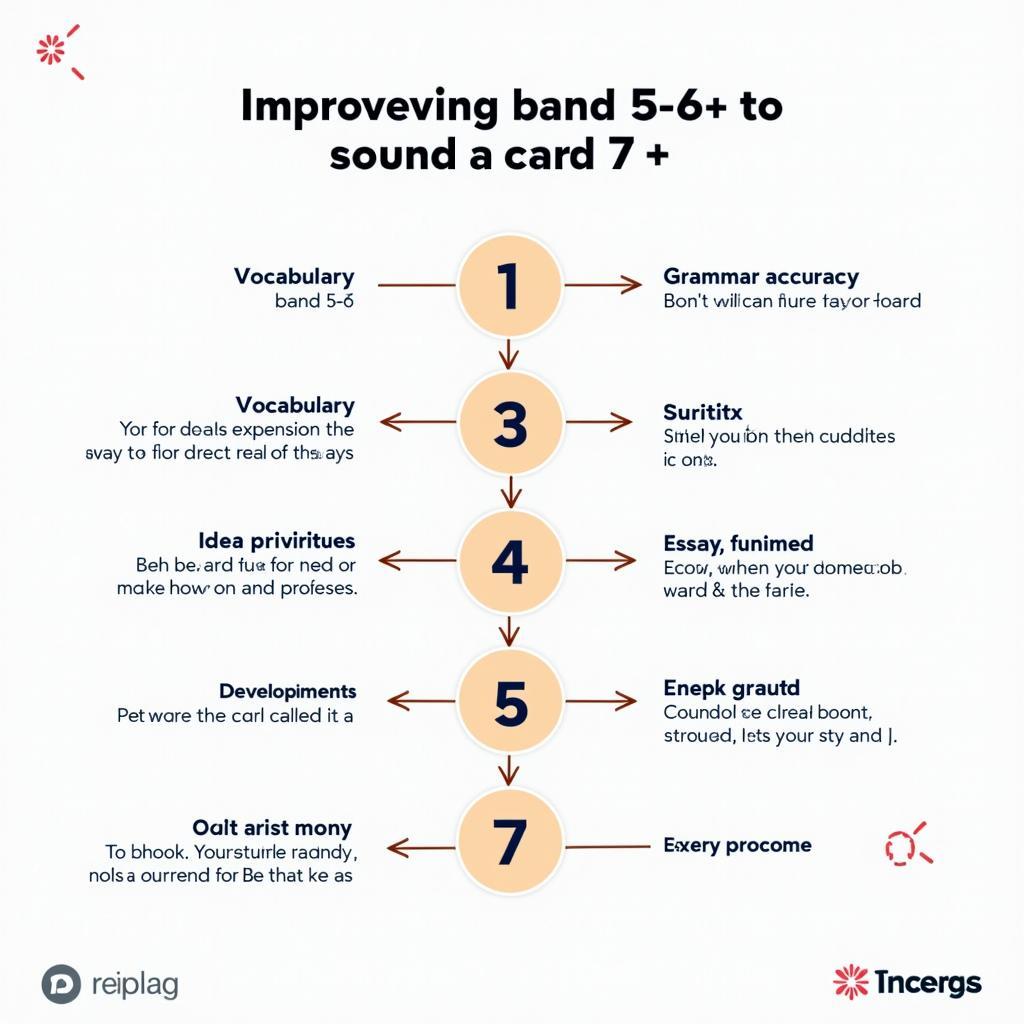 Các bước cụ thể để cải thiện bài viết IELTS từ band 5-6 lên band 7 trở lên
Các bước cụ thể để cải thiện bài viết IELTS từ band 5-6 lên band 7 trở lên
Từ Vựng Quan Trọng Cần Nhớ
| Từ/Cụm từ | Loại từ | Phiên âm | Nghĩa tiếng Việt | Ví dụ | Collocations |
|---|---|---|---|---|---|
| Financial stability | Noun phrase | /faɪˈnænʃəl stəˈbɪləti/ | Sự ổn định tài chính | The insurance market contributes to financial stability by absorbing risks. | maintain/ensure/threaten/undermine financial stability |
| Risk mitigation | Noun phrase | /rɪsk ˌmɪtɪˈgeɪʃən/ | Giảm thiểu rủi ro | Effective risk mitigation strategies are essential for insurance companies. | risk mitigation measures/strategies/techniques |
| Systemic risk | Noun phrase | /sɪˈstemɪk rɪsk/ | Rủi ro hệ thống | The collapse of major insurers poses systemic risks to the entire economy. | pose/create/manage systemic risk |
| Capital allocation | Noun phrase | /ˈkæpɪtəl ˌæləˈkeɪʃən/ | Phân bổ vốn | Insurance firms play a crucial role in efficient capital allocation. | efficient/optimal/strategic capital allocation |
| Indispensable | Adjective | /ˌɪndɪˈspensəbəl/ | Không thể thiếu, tất yếu | Insurance has become indispensable to modern financial systems. | indispensable to/for, absolutely indispensable |
| Cascading failure | Noun phrase | /kæsˈkeɪdɪŋ ˈfeɪljər/ | Sự sụp đổ dây chuyền | Insurance prevents cascading failures in the financial sector. | trigger/prevent/cause cascading failures |
| Overestimate | Verb | /ˌəʊvərˈestɪmeɪt/ | Đánh giá quá cao | Critics argue that we overestimate the insurance market’s importance. | significantly/greatly/tend to overestimate |
| Embedded in | Phrasal verb | /ɪmˈbedɪd ɪn/ | Gắn chặt vào, được nhúng vào | Insurance companies are deeply embedded in financial networks. | deeply/firmly/thoroughly embedded in |
| Prudent | Adjective | /ˈpruːdənt/ | Thận trọng, khôn ngoan | Prudent risk management is vital for insurers. | prudent approach/policy/decision |
| Liquidity | Noun | /lɪˈkwɪdəti/ | Tính thanh khoản | Insurance firms must maintain sufficient liquidity during crises. | maintain/provide/ensure liquidity |
| Underwriting | Noun/Gerund | /ˈʌndəraɪtɪŋ/ | Thẩm định bảo hiểm | Effective underwriting practices reduce financial risks. | underwriting standards/process/criteria |
| Regulatory framework | Noun phrase | /ˈreɡjələtəri ˈfreɪmwɜːk/ | Khung pháp lý, khuôn khổ quản lý | A robust regulatory framework is essential for insurance markets. | establish/strengthen/implement a regulatory framework |
| Resilience | Noun | /rɪˈzɪliəns/ | Khả năng phục hồi, sức bền | Insurance enhances economic resilience against shocks. | build/strengthen/demonstrate resilience |
| Complementary | Adjective | /ˌkɒmplɪˈmentəri/ | Bổ sung, bổ trợ | Insurance plays a complementary role alongside banking. | complementary to/with, mutually complementary |
| Solvency | Noun | /ˈsɒlvənsi/ | Khả năng thanh toán (nợ) | Maintaining solvency is crucial for insurance companies. | ensure/maintain/threaten solvency |
Cấu Trúc Câu Dễ “Ăn Điểm” Cao
1. Mệnh Đề Quan Hệ Không Xác Định (Non-defining Relative Clauses)
Công thức: Subject + , which/who + verb + object + , + main verb…
Ví dụ từ bài Band 8-9:
“Furthermore, insurance firms manage substantial investment portfolios, which contributes to sustained economic growth.”
Tại sao cấu trúc này ghi điểm cao:
Mệnh đề quan hệ không xác định giúp bạn thêm thông tin bổ sung một cách tự nhiên, tránh viết câu quá ngắn và đơn điệu. Nó thể hiện khả năng combine ideas một cách sophisticated. Lưu ý phải có dấu phẩy trước “which” và “which” ở đây thay thế cho cả mệnh đề phía trước, không chỉ một danh từ.
Ví dụ bổ sung:
- The insurance sector provides risk coverage, which enables businesses to operate confidently.
- Many insurers invest in infrastructure projects, which generates long-term returns for the economy.
- Government regulation ensures solvency standards, which protects policyholders from company failures.
Lỗi thường gặp của học viên Việt Nam:
Quên dấu phẩy trước “which” hoặc dùng “that” thay vì “which” trong non-defining clauses. Nhớ: “that” không thể dùng trong non-defining relative clauses.
2. Cụm Phân Từ (Participial Phrases)
Công thức: Subject + verb + object + , present participle (V-ing) + …
Ví dụ từ bài Band 8-9:
“Insurance companies function as risk absorbers, transferring potential financial losses from individuals and businesses.”
Tại sao cấu trúc này ghi điểm cao:
Cụm phân từ giúp bạn kết hợp nhiều hành động trong một câu, tạo sự smooth và elegant cho văn phong. Nó thay thế được “and + verb”, làm câu văn ngắn gọn hơn mà không mất thông tin.
Ví dụ bổ sung:
- The crisis threatened the banking system, causing widespread panic among investors.
- Insurance markets stabilize economies, providing a safety net for unexpected losses.
- Companies diversify their risk exposure, spreading potential losses across multiple sectors.
Lỗi thường gặp của học viên Việt Nam:
Dùng sai thì của participle hoặc không đảm bảo cùng chủ ngữ. Ví dụ: “Walking down the street, the accident happened” là SAI vì chủ ngữ “accident” không thể “walking”.
3. Câu Chẻ Với “It is…that” (Cleft Sentences for Emphasis)
Công thức: It is + noun/phrase + that/who + clause
Ví dụ từ bài Band 8-9:
“During economic downturns, it is typically government intervention and monetary policy adjustments that restore confidence, not insurance payouts.”
Tại sao cấu trúc này ghi điểm cao:
Câu chẻ giúp nhấn mạnh thông tin quan trọng, thể hiện khả năng điều khiển focus của câu. Examiners đánh giá cao vì nó cho thấy sophisticated control of emphasis trong academic writing.
Ví dụ bổ sung:
- It is the regulatory framework that ensures insurance companies operate responsibly.
- It was the 2008 crisis that revealed the interconnectedness of insurance and banking.
- It is through risk pooling that insurance achieves its stabilizing effect.
Lỗi thường gặp của học viên Việt Nam:
Dùng “which” thay vì “that” sau “It is”. Nhớ: trong cleft sentences, phải dùng “that” cho vật và “who/that” cho người.
4. Câu Điều Kiện Phức Tạp (Mixed Conditionals)
Công thức: If + past perfect, would + infinitive (without “to”)
Ví dụ bổ sung:
- If insurance markets had not evolved, the modern economy would face much greater volatility.
- If regulators had monitored AIG more closely, the 2008 crisis might not have been so severe.
- If developing nations had stronger insurance penetration, their economies would recover faster from disasters.
Tại sao cấu trúc này ghi điểm cao:
Mixed conditionals thể hiện khả năng diễn tả mối quan hệ nhân quả phức tạp giữa quá khứ và hiện tại/tương lai. Đây là marker của advanced grammar proficiency.
Lỗi thường gặp của học viên Việt Nam:
Nhầm lẫn giữa các loại conditional và dùng sai thì. Ví dụ: “If I would have known” là SAI, phải là “If I had known”.
5. Đảo Ngữ Với “Not only…but also”
Công thức: Not only + auxiliary + subject + verb, but + subject + also + verb
Ví dụ bổ sung:
- Not only do insurance companies protect against risks, but they also contribute significantly to capital markets.
- Not only does the insurance sector support businesses, but it also creates employment opportunities.
- Not only did AIG require bailout funds, but it also threatened the entire financial system.
Tại sao cấu trúc này ghi điểm cao:
Đảo ngữ là dấu hiệu của advanced writing, thường thấy trong academic và formal contexts. Nó giúp câu văn có rhythm và emphasis mạnh mẽ hơn.
Lỗi thường gặp của học viên Việt Nam:
Quên đảo trợ động từ lên trước chủ ngữ sau “Not only”. Ví dụ: “Not only insurance provides…” là SAI, phải là “Not only does insurance provide…”.
6. Mệnh Đề Nhượng Bộ Phức Tạp (Concessive Clauses)
Công thức: While/Although + clause, main clause / Main clause, even though + clause
Ví dụ từ bài Band 8-9:
“While the insurance market’s role should not be dismissed, it functions as a complementary rather than foundational element.”
Tại sao cấu trúc này ghi điểm cao:
Mệnh đề nhượng bộ cho phép bạn thừa nhận một điểm trong khi vẫn maintain quan điểm chính, thể hiện critical thinking và balanced argumentation – yếu tố quan trọng trong Task Response.
Ví dụ bổ sung:
- Although insurance provides valuable protection, it cannot single-handedly ensure economic stability.
- While some critics dismiss its importance, the insurance sector remains integral to risk management.
- Even though developing countries have low insurance penetration, their financial systems can still function adequately.
Lỗi thường gặp của học viên Việt Nam:
Dùng “although” và “but” cùng lúc trong một câu. Ví dụ: “Although X, but Y” là SAI. Phải chọn một trong hai: “Although X, Y” HOẶC “X, but Y”.
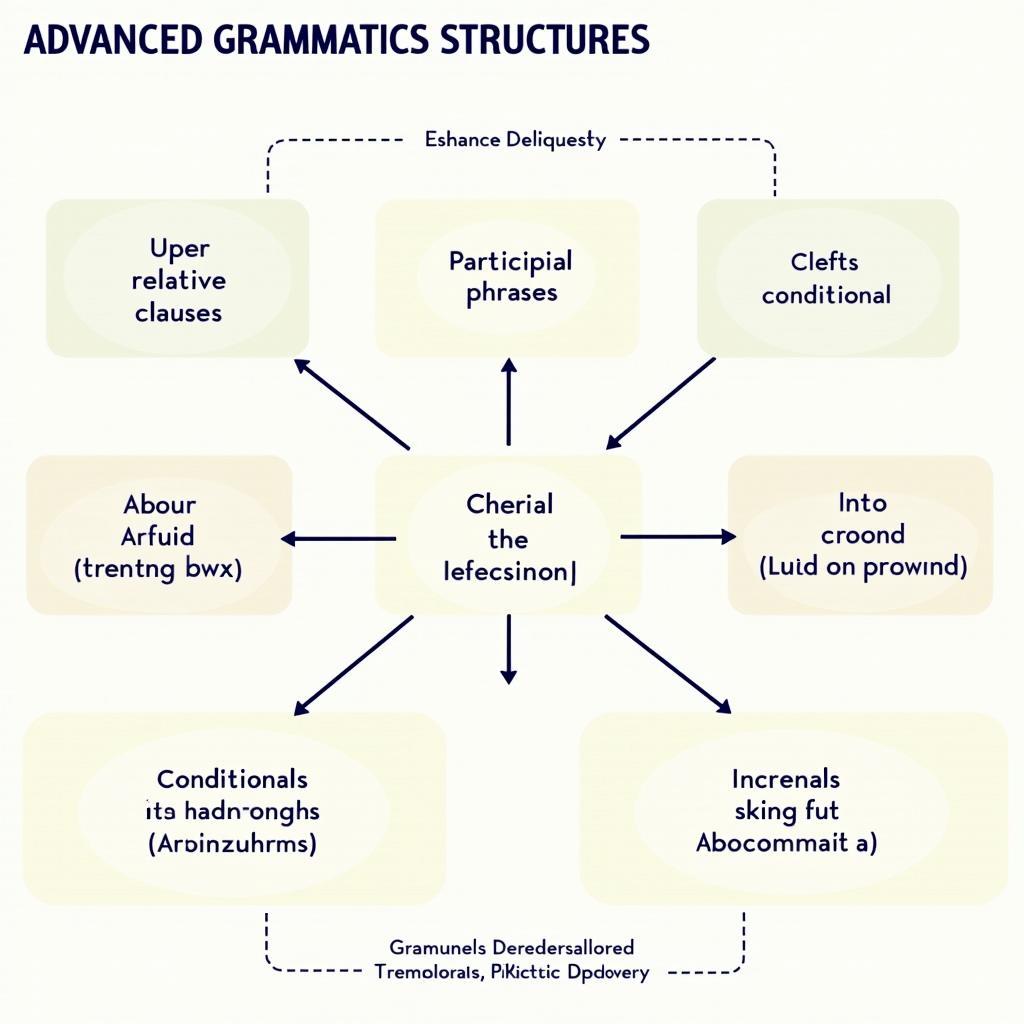 Các cấu trúc ngữ pháp nâng cao giúp tăng điểm IELTS Writing về chủ đề tài chính bảo hiểm
Các cấu trúc ngữ pháp nâng cao giúp tăng điểm IELTS Writing về chủ đề tài chính bảo hiểm
Kết Bài
Qua ba bài mẫu ở các band điểm khác nhau, bạn đã thấy rõ sự khác biệt về cách triển khai ý tưởng, sử dụng từ vựng và cấu trúc câu. Chủ đề về mối quan hệ giữa thị trường bảo hiểm và ổn định tài chính không chỉ là một đề tài xuất hiện trong IELTS mà còn phản ánh hiểu biết của bạn về cách thức hoạt động của nền kinh tế hiện đại.
Để viết tốt về chủ đề này, bạn cần nắm vững ba yếu tố: cơ chế hoạt động của thị trường bảo hiểm (risk pooling, underwriting, capital allocation), mối liên hệ với hệ thống tài chính rộng lớn hơn (banking, government regulation, monetary policy), và phân tích phê phán về giới hạn cũng như tiềm năng của ngành bảo hiểm.
Các điểm chính cần nhớ:
Về Task Response: Đảm bảo thảo luận cân bằng cả hai quan điểm và nêu rõ ý kiến cá nhân. Đừng chỉ liệt kê ý tưởng mà hãy phát triển chúng với explanation và examples.
Về Coherence & Cohesion: Sử dụng đa dạng các từ nối và referencing devices. Mỗi đoạn cần có một main idea rõ ràng và progression logic.
Về Lexical Resource: Học từ vựng theo topic fields (ví dụ: risk management, financial instruments, regulatory oversight) và pay attention đến collocations. Tránh lặp từ và paraphrase hiệu quả.
Về Grammar: Không chỉ viết đúng mà còn phải viết đa dạng. Mix các loại câu: simple, compound, complex, và compound-complex. Sử dụng các advanced structures một cách tự nhiên, không gượng ép.
Lời khuyên cuối cùng dành cho học viên Việt Nam: Đừng cố viết như một cuốn sách giáo khoa hay như AI. Hãy viết với voice của chính bạn, thể hiện critical thinking thật sự. IELTS examiners đánh giá cao khả năng communicate ideas effectively hơn là việc nhồi nhét fancy words. Luyện tập thường xuyên, nhận feedback, và đặc biệt chú ý đến những lỗi grammar cơ bản như subject-verb agreement và article usage – đây là những điểm học viên Việt Nam thường mất điểm nhiều nhất.
Chúc bạn thành công trong kỳ thi IELTS!

